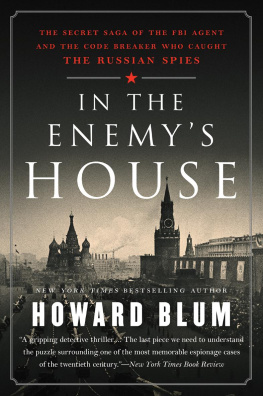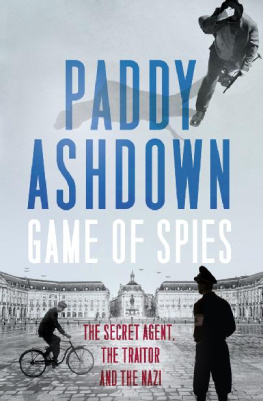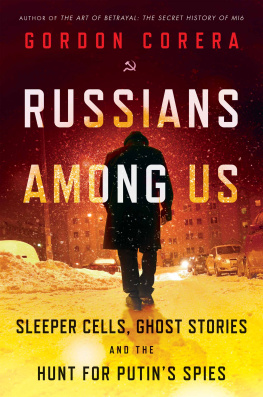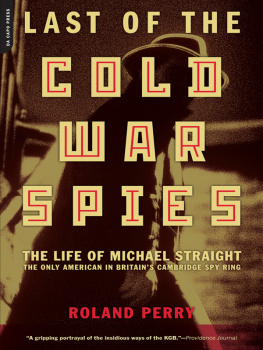Dick Kalla - Russian Spies, Qadhafi, And Other Memories
Here you can read online Dick Kalla - Russian Spies, Qadhafi, And Other Memories full text of the book (entire story) in english for free. Download pdf and epub, get meaning, cover and reviews about this ebook. year: 2013, genre: Religion. Description of the work, (preface) as well as reviews are available. Best literature library LitArk.com created for fans of good reading and offers a wide selection of genres:
Romance novel
Science fiction
Adventure
Detective
Science
History
Home and family
Prose
Art
Politics
Computer
Non-fiction
Religion
Business
Children
Humor
Choose a favorite category and find really read worthwhile books. Enjoy immersion in the world of imagination, feel the emotions of the characters or learn something new for yourself, make an fascinating discovery.

- Book:Russian Spies, Qadhafi, And Other Memories
- Author:
- Genre:
- Year:2013
- Rating:5 / 5
- Favourites:Add to favourites
- Your mark:
- 100
- 1
- 2
- 3
- 4
- 5
Russian Spies, Qadhafi, And Other Memories: summary, description and annotation
We offer to read an annotation, description, summary or preface (depends on what the author of the book "Russian Spies, Qadhafi, And Other Memories" wrote himself). If you haven't found the necessary information about the book — write in the comments, we will try to find it.
Russian Spies, Qadhafi, And Other Memories — read online for free the complete book (whole text) full work
Below is the text of the book, divided by pages. System saving the place of the last page read, allows you to conveniently read the book "Russian Spies, Qadhafi, And Other Memories" online for free, without having to search again every time where you left off. Put a bookmark, and you can go to the page where you finished reading at any time.
Font size:
Interval:
Bookmark:
Copyright 2007
By Dick Kalla
All rights reserved. Printed in the United States of America. No part of this book may be used or reproduced in any manner whatsoever without written permission except in the case of brief quotations embodied in critical articles and reviews.
FIRST EDITION
Russian Spies, Qadhafi and Other Memories
By Dick Kalla
All the events described in this book came from the memory of the author. Any mistakes or misstatements are regretted but not to be unexpected.
Contents
Foreword
T his memoir is dedicated to all my relatives and friends who have asked me what I did in the Foreign Service. As I have struggled to explain my job, many of you have shaken your heads knowingly, seemingly secure in your knowledge that I was some kind of spy. Try as I might to explain otherwise, there were always a few skeptics who thought I was trying to cover up my real occupation. Let me state here for the last and final time -- I was not a spy. In fact, the State Department has no spies! There are people overseas who do that kind of thing, possibly even some assigned to Embassies, but they do not work for the State Department, at least not directly. I worked exclusively for the Department of State as a communicator. My job title and duties changed drastically over the years as I climbed the government ladder; but, as a Foreign Service communicator, my primary responsibility was the transmission and receipt of all diplomatic correspondence (classified and unclassified -- electronic or otherwise) at the Embassy where I was assigned. Over the years my responsibilities increased to include managing the Embassy switchboard, the Embassys various computer networks, radio networks, etc. I can feel eyes begin (once again) to glaze over as I start to list what I did at my overseas Embassy so I wont bore you any longer. Suffice it to say that I did many things during my 33 years in the Foreign Service, but none of them involved spying. If, after that long explanation above, you still choose to believe that I was a spy, go ahead, its just not true.
Another reason for writing this memoir is to try to show what we (the Kalla family) did for those 33 years that we spent in 12 different countries. In the past, we have tried to explain to our friends and relatives about our experiences. Some of you have been very interested and have listened intently as we excitedly rambled on about our adventures. Others of you have put up with our babble, but have clearly not been able to relate (not your fault) to what we were trying to tell you. When that happened, you usually changed the subject to a topic with which you were more familiar (understandable). If you fall in that category, this is your chance to read about our adventures at your leisure. Of course, if you have no interest in exploring my life journey, you are under no obligation to go any further and this would be a good place to quit reading.
Am I being too self-important calling this work a memoir? At first glance I thought so. Dont only important or famous people write memoirs? Im certainly not famous and I dont feel especially important. At a loss for what else to call it, I consulted my handy Websters College Dictionary for an answer. The very first definition Websters gives for the word memoir is: A record of events based on the writers personal observations. That sounds exactly like what I am doing. I am writing my personal observations about things that happened to my family and me while I served in the Foreign Service. Armed with this definition, I have decided that a memoir is what it is. On the other hand, this is not a complete accounting of my Foreign Service experiences. The material herein consists of brief slices of life at each post where we were stationed. Is it enough to be called a memoir? I dont know, but I guess it will have to do. If it bothers you, call it what you like.
Portions of the material contained in this memoir were originally published in the CANDOER Report, an informal periodical directed specifically at retired Foreign Service communicators. CANDOER made it a point to solicit material from retirees like me; and, after initially submitting an article or two to test the water; I decided to write about each of my 12 Foreign Service assignments. They form the basis for this work.
However, since those articles were meant to be read by retired communicators, much of the material they contained would probably not be of great interest or understandable to anyone who did not work behind the vaulted doors of a classified overseas communications office. Therefore, I have taken the liberty of changing some of the original material so that it could be better understood by everyone. In other cases, I left parts of the original article intact to try to give the reader a better feel for the work that I did. Since this is not a travelogue, there are places we lived where the only real interesting things, in my mind, happened at work; and if I eliminated those references, there wouldnt be much left about which to write. I hope that I have succeeded in making this memoir informative, interesting and enjoyable. If it isnt, it cost you nothing but time.
Finally, I should say that everything I have written is true or at least as true as my rapidly diminishing memory allows. If there are any inaccuracies, they are strictly accidental and have not been included to simply spice up the story. I have not tried to verify or provide other sources for anything contained herein. In some cases I have eliminated names to protect the reputations of people. Other times, I kept the names to make the story more interesting. If anyone I have written about objects or finds fault with what I have written, I apologize in advance. It was not my intention to besmirch reputations. I merely attempted to provide the stories as they were told to me, or as I remember them.
Chapter One
Growing up in Raymond
A sage once proclaimed, Life is a journey. I dont believe that he was speaking specifically about the Foreign Service; but, for anyone who spent a career working for the Department of State overseas, life is surely a journey. My lifes journey began in earnest when I joined the U.S. Navy in 1960 after completing high school. Thats not to say that I saw and traveled the world while in the Navy. On the contrary, I never left California during my entire naval experience. What the Navy did was to teach me a skill that made me desirable to the Foreign Service and, ultimately, led to a life spent traveling the world.
Very little in my childhood pointed to a life of travel and overseas living. Sure, my family moved six times before I was six, but all the moves were within a 120-mile radius. Our final move was to Raymond, a small town in southwestern Washington where my mother had been born and raised. We didnt move again after that. Well, thats not quite accurate, I guess. We did move a couple of blocks when my dad built the house in which my mother still lives. But, from the time I was six years old until I left home at eighteen to join the Navy; I lived a happy, carefree but sheltered life. This was a product of the small town atmosphere in which I was brought up. It was a safe nurturing environment. In the 1950s in small town America, at least small town Raymond, Washington, people rarely locked their doors. Raymond is a mill town located hard on the banks of the Willipa River. From Raymond, the Willipa flows west a couple of miles and empties into Willipa Bay and then the Pacific Ocean. Through the years, the resident population of Raymond has fluctuated between 2,000 and 4,000 people, depending primarily upon how the timber industry was doing at that particular time. During most of my school years, the population was on the high end. Those who wanted employment were usually able to find it, particularly if they were able and willing to do hard manual labor. High paying jobs were few, but were not necessary to support a full and robust lifestyle in Raymond. Life was simpler then, and most people in Raymond and probably most towns like it lived what would probably be described as a lower middle class existence. But we had enough food to eat and clothes to wear; and, if we were missing a few of lifes finer things, we didnt realize it. At least, thats the way I remember it. I suppose some people had a little more money than others, but it didnt seem too important then. There was very little serious crime, and the drug scene was yet to come. I went through the usual growing pains and pressures, but they were balanced by small town values and respect. I barely noticed that there was a whole different world outside my small town.
Font size:
Interval:
Bookmark:
Similar books «Russian Spies, Qadhafi, And Other Memories»
Look at similar books to Russian Spies, Qadhafi, And Other Memories. We have selected literature similar in name and meaning in the hope of providing readers with more options to find new, interesting, not yet read works.
Discussion, reviews of the book Russian Spies, Qadhafi, And Other Memories and just readers' own opinions. Leave your comments, write what you think about the work, its meaning or the main characters. Specify what exactly you liked and what you didn't like, and why you think so.







